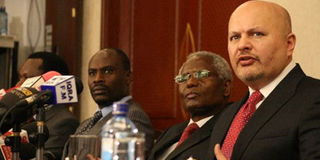Why Muthaura’s ICC case collapsed

Former head of public service and cabinet secretary Francis Muthaura (second right) and his legal team headed by Karim Khan (right) at a news conference at Serena hotel on March 13 2013 where Muthaura issued a personal statement after his case was dropped at the ICC. Photo/PHOEBE OKALL
What you need to know:
- Defence team accuses prosecution of adopting a ‘very dangerous style’ of investigation
- Prosecution’s fear of sanctions over failure to disclose revelation by Witness 4 may have motivated dropping of charges
Former Head of Public Service Francis Muthaura says he is not celebrating though criminal charges against him were dropped.
But he is glad that his 93-year-old mother and 91-year-old father-in-law have lived to witness his discharge by the International Criminal Court.
Reflecting on what he called an “awful odyssey to the ICC,” Mr Muthaura curtly summed up his experience. “The ICC case broke my heart.”
This captured the pain of a man whose distinguished career in the civil service came to a sour end after he was accused of crimes against humanity by the Hague-based court.
And it was clear that he blames former ICC chief prosecutor Luis Moreno-Ocampo for his predicament.
He said the role of chief prosecutor at the ICC, considered the highest criminal court in the world, is a very important one because it affects lives, and any errors can shatter whole families – irreparably.
“To the prosecutor I say, please be fair – please investigate your cases – please look for the truth and make sure that your staff live by this guiding principle.”
The dropping of the charges has turned the spotlight firmly on the quality of investigations and conduct of the prosecution in the case.
ICC chief prosecutor Fatou Bensouda, who took over from Moreno Ocampo at the end of his term, withdrew charges against Mr Muthaura after it became apparent that her key witness —without whom the case could not have been confirmed— had lied in his testimony.
In a submission during a status conference on Monday, Ms Bensouda indicated her office had dropped the key witness against Mr Muthaura after he recanted a crucial part of his evidence and admitted that he had accepted bribes.
But it appears that the prosecution’s fear of sanctions over its failure to disclose a document containing Witness Four’s revelation that he had lied before the pre-trial hearings may have led the prosecutor to drop the Muthaura case.
In its submission on March 8 ahead of the conference, the defence had asked the trial judges to take action against the prosecution for its decision not to inform the court that the witness had renounced his testimony.
Mr Muthaura’s defence was led by British lawyer Karim Khan. Other members included Ken Ogeto of the Kenyan Bar and Gambian Essa Faal and Malaysian Shymala Alegendra both of whom previously worked as prosecution attorneys at the ICC.
The defence team told the judges that the prosecutor’s conduct was a breach of the Rome Statute that demands disclosure of exonerating evidence, integrity of prosecution as well as good faith.
They accuse the prosecution of adopting a “very dangerous style” of investigations that was prejudicial to the rights of the accused.
The prosecution dropped its allegations when it became apparent that Witness Four was not credible. And the main bone of contention is that the prosecution was aware that his testimony could not be relied upon but went ahead to use it to confirm the case.
This is the witness who claimed to have been present at critical meetings at State House and the Nairobi Club where Mr Muthaura and his co-accused, Uhuru Kenyatta allegedly planned the 2007/8 violence.
The witness had given a detailed description of the Nairobi Club meeting to the extent of describing the colour of the table cloth and cutlery on the table in the room on that day.
He later confessed that he had lied and the prosecution is on the spot for concealing the revelation.
Judges were told that all other witnesses with whom he claimed to have attended the State House meeting say he did not.
Apparently, both the prosecution and the defence had interviewed the “friend” who denied any knowledge of the meetings. A statement by the friend presented by the defence was rejected by the pre-trial judges.
But in her defence, Ms Bensouda who described her Monday decision as “exceptional” claims that the non-disclosure was an “innocent” oversight or error by a junior reviewer.
When withdrawing the charges, Ms Bensouda stressed that she had sufficient evidence against Mr Kenyatta, now the President-elect.
However, the decision has triggered on the debate on its the likely consequences on the Kenyatta because they are co-accused.
As the court waits for her explanation later this week, the Monday decision is certainly a relief for Mr Muthaura and can now enjoy his retirement without the shadow of ICC judges—and expensive trips to The Netherlands.




